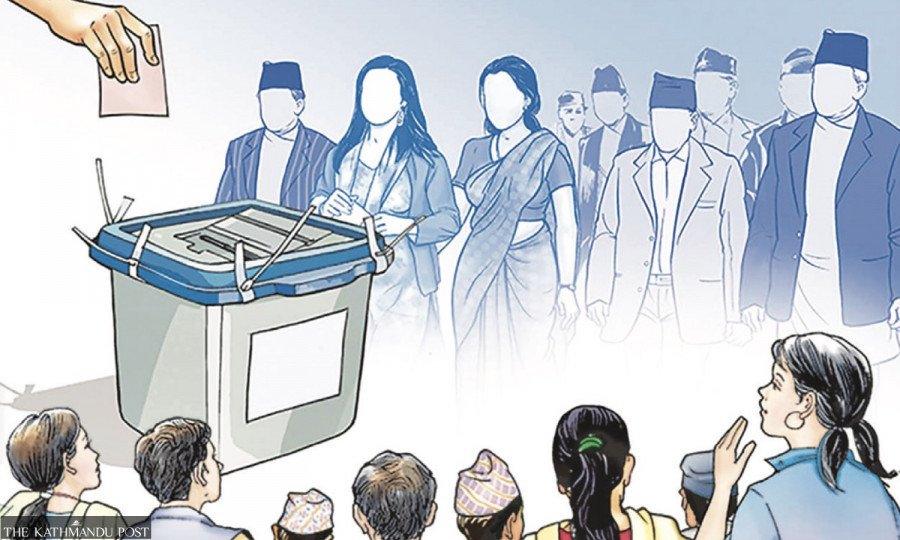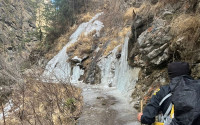National
Judiciary reminds poll body to ensure voting rights for expats
As 2027 vote looms, parties, officials divided on inclusion of millions of Nepalis abroad in the election process.
Binod Ghimire
As political parties start devising strategies for the 2027 general elections (‘Mission 84’), the Judgement Enforcement Directorate under the judiciary has reminded the Election Commission to implement the Supreme Court’s verdict ensuring the voting rights of Nepalis residing abroad in the next polls.
Acting on the application from the Rastriya Swatantra Party (RSP)-affiliated lawyers, the directorate also sought response from the constitutional poll body on the progress made to this effect. Advocate Yagya Mani Neupane, who is associated with the RSP, had written to the directorate to ensure the implementation of the eight-year-old verdict.
Neupane sought the directorate’s intervention days after different teams from the party met Nepali diaspora communities in various countries. “The commission has received a letter from the directorate. Also, RSP leaders came to draw its attention in implementing the court order,” Nita Pokharel Aryal, spokesperson at the commission, told the Post.
A division bench of justices Sapana Malla Pradhan and Purushottam Bhandari, on April 27, 2017, had directed the government to ensure voting rights of Nepalis citizens living abroad.
“Make all necessary arrangements for ensuring the voting rights of all Nepalis living abroad,” read the verdict. It said Nepalis who have not renounced their citizenship, not acquired citizenship of another country, hold a voter identity card issued by the Election Commission, and have their names on the lists updated by a diplomatic mission should be allowed external voting.
The apex court also directed the government to guarantee voting rights either through representatives, postal service, or electronic voting in the premises of diplomatic missions—whichever best ensures free, fair and secret voting in a cost-effective and hassle-free manner.
The court also instructed the government to acknowledge the contribution of citizens working abroad to Nepal’s economy by making it possible for them to vote, saying conducting the polls by keeping a significant chunk of the population away would not only curtail civic rights. Such poll results would also not represent the true will of citizens.
“The commission is committed to implementing the order,” said Aryal. “However, it requires a law in the first place. The next step is logistics management and other preparations.”
The commission has already prepared a draft bill to amend and consolidate the election laws submitted to the government, proposing 27 revisions in the existing legal provisions including a provision to enable Nepali citizens living abroad to exercise their franchise. The commission has proposed provisions to allow them to vote under the proportional representation category via Nepal’s diplomatic missions in the respective countries.
“It’s been more than two years since the commission submitted the bill on July 3, 2023, but the government has yet to finalise it,” said Dinesh Thapaliya, who recently retired as the chief election commission. “If the law is enacted and the commission gets full cooperation from the government and political parties, external voting can be started from a few countries.”
Thapaliya said the commission has already prepared a working plan to start voter registration immediately after the new law comes into force. “Now, the ball is the government’s and parliament’s court,” said Thapaliya. He said postal voting, electronic-voting, and early voting could be the options.
Postal voting allows voters to send ballots by mail, accompanied by their identification details. Electronic-voting, if implemented securely, could be a game-changer—countries like Estonia have successfully used such systems. Early voting would allow eligible voters to cast their ballots ahead of time and is in practice in 100 countries, he said.
Some election officials, however, are not optimistic of the prospect. “Publicly, the parties always advocate for such rights, but they stand against this during discussions at the commission,” said a senior official at the Election Commission. The official said ensuring voting rights for the Nepali diaspora would be a challenge even if there is a consensus on the issue.
Most Nepali are residing in Gulf countries which do not follow a democratic system. “Will they allow workers to vote, especially when their numbers are higher than the local population, say in Qatar?,” he asked.
“Voting is a right to elect rulers. Why should someone, for instance being ruled by Donald Trump, be allowed to choose rulers of Nepal? In my opinion only migrant workers who have the high prospect of returning should be allowed to exercise their voting rights.”




 9.56°C Kathmandu
9.56°C Kathmandu














